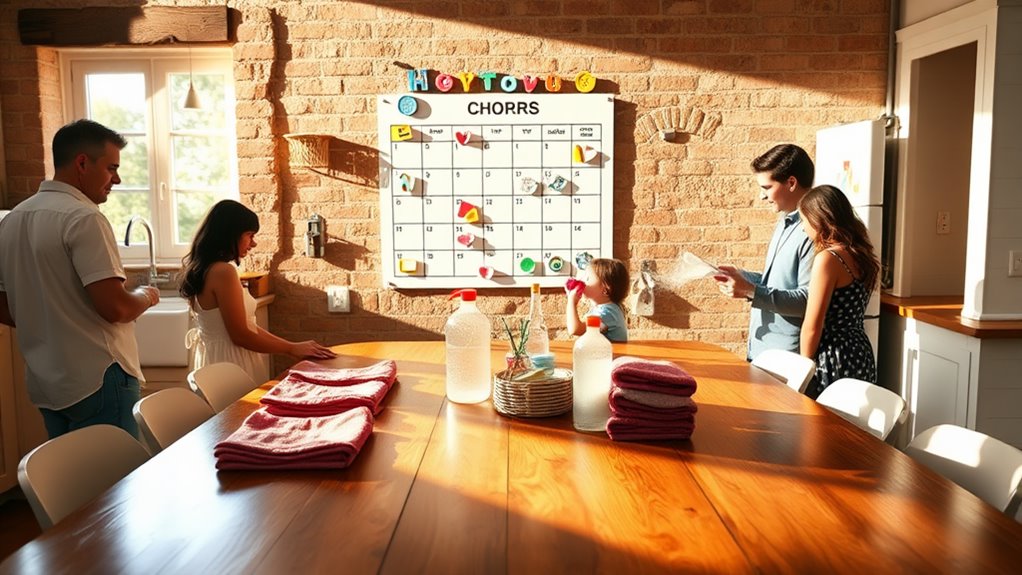Chore Schedules That Actually Get Done!
To create chore schedules that actually get done, start by organizing tasks according to everyone’s strengths and preferences. Hold family meetings to assign age-appropriate chores and establish a reward system for completing them. Use shared calendars and digital tools to keep everyone accountable and on track. Combine similar tasks for efficiency and set specific days for routine chores, like laundry on Wednesdays. Regularly review the schedule to maintain engagement and motivation. Celebrate small successes to foster a positive atmosphere. Keep going, and you’ll discover even more effective tips for making your chore schedules work seamlessly!
Key Takeaways
- Organize chores by aligning tasks with individual strengths and preferences to enhance engagement and accountability.
- Utilize a shared calendar to sync family schedules and set reminders for task completion.
- Implement a reward system to incentivize consistent participation and celebrate accomplishments.
- Regularly review and adjust chore schedules to keep them relevant and maintain motivation.
- Combine similar chores and designate specific days for routine tasks to streamline efforts and save time.
Understanding Chore Schedules
When you create a chore schedule, you not only organize tasks but also foster a sense of responsibility within your household. It helps everyone understand their roles and the importance of contributing to a clean and functional living space.
To make it effective, consider each person’s strengths and preferences. You might find that your kids enjoy dusting more than vacuuming, or that a partner prefers kitchen duties over laundry. By assigning tasks that align with these preferences, you increase the chances of tasks getting done without resistance.
Regularly review and adjust the schedule as needed, keeping communication open to guarantee everyone feels heard and engaged. This way, you’re not just delegating chores; you’re building teamwork and accountability.
Time-Saving Techniques
To save time while managing a chore schedule, prioritize tasks based on urgency and frequency. Focus on what needs immediate attention, like taking out the trash or cleaning spills, and tackle those first.
Combine similar tasks to maximize efficiency; for instance, dusting while vacuuming saves time. Set specific time limits for each chore, so you don’t get sidetracked. Use timers to create a sense of urgency and keep yourself accountable.
You can also designate a certain day for specific chores, like laundry on Wednesdays, to establish a routine. Finally, keep your cleaning supplies organized and accessible, so you won’t waste time looking for them.
Implementing these techniques will streamline your chore schedule and free up your valuable time.
Encouraging Family Participation
Getting the whole family involved in chore schedules can greatly boost efficiency and lighten the load. Start by holding a family meeting to discuss everyone’s preferences and strengths. When you include everyone in the decision-making process, they’re more likely to feel invested in the tasks.
Assign age-appropriate chores, making sure each member has a role that suits their abilities. To keep motivation high, establish a reward system—perhaps a family outing or a special treat for completing tasks consistently. Celebrate successes together, no matter how small. This creates a positive atmosphere where everyone feels valued.
Digital Tools for Organization
As you explore digital tools for organizing chore schedules, you’ll discover a variety of apps and platforms designed to streamline the process.
These tools not only keep everyone on the same page but also make assigning tasks easier. Here are some features to contemplate:
- Shared Calendars: Sync with family members to see everyone’s schedules.
- Task Reminders: Set notifications to guarantee chores aren’t forgotten.
- Progress Tracking: Monitor who’s completed their tasks for accountability.
- Reward Systems: Incorporate gamification to motivate participation.
Using these tools can transform how your family approaches chores, making the experience more efficient and collaborative.
Embrace technology to bring order to your chore schedules and keep everyone engaged.
Maintaining Consistency and Motivation
While it might be easy to set up a chore schedule, maintaining consistency and motivation can be challenging. To stay on track, start by setting realistic goals. Break larger tasks into smaller, manageable steps, and celebrate each accomplishment. You’ll feel a sense of achievement, which boosts motivation.
Incorporate a reward system—treat yourself after completing chores. You might also find that teaming up with family members or friends makes chores more enjoyable and holds everyone accountable.
Finally, regularly review your schedule to adjust as needed, keeping it fresh and relevant. Remember, consistency isn’t about perfection; it’s about progress. Embrace the journey, and don’t hesitate to adjust your approach if you feel your motivation waning.
Frequently Asked Questions
How Can I Handle Resistance From Family Members About Chores?
Handling resistance from family members about chores can be tough. You can start by discussing everyone’s preferences, setting clear expectations, and creating a collaborative plan. Encourage openness, and be willing to compromise for better cooperation.
What if My Schedule Doesn’t Align With Family Members’ Availability?
If your schedule doesn’t align with family members’ availability, communicate openly. Find common ground by adjusting times or splitting tasks. Flexibility’s key; you can create a routine that accommodates everyone’s needs while ensuring chores get done.
Are There Chore Schedules for Young Children?
Yes, there are chore schedules designed for young children. You can create simple, age-appropriate tasks that engage them. Use visuals or charts to make it fun, and celebrate their accomplishments to encourage participation.
How Do I Adjust the Schedule for Unexpected Events?
When unexpected events arise, you can adjust your schedule by prioritizing tasks, shifting deadlines, and communicating changes. Stay flexible and allow yourself grace; it’s okay to adapt plans as life unfolds.
What Are Some Rewards for Completing Chores Effectively?
You can reward yourself with small treats like a favorite snack, extra screen time, or a relaxing bath after completing chores. Celebrating accomplishments boosts motivation and makes the process more enjoyable and fulfilling for you.



